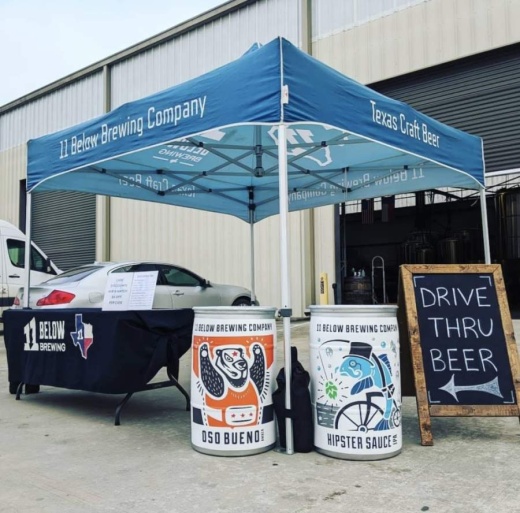Bryce Baker co-founded the brewery in 2015 with two others who first began as home brewers, dreaming of one day opening their own brewery.
But as coronavirus regulations shuttered taprooms across the state, 11 Below Brewing had to rethink its celebration, Baker said.
“We had all these plans to have a fifth anniversary bash, and our bash was basically in drive-thru format of people driving and getting specialty anniversary beers and specialty glassware," he said. "So it was kind of weird way to celebrate, but we still got to ... do it.”
In the short term, coronavirus has forced breweries to shift their business models and revamp their to-go options. Still, breweries in the Greater Houston area—and across the state—have been hit hard.
A recent survey in late March from the Brewers Association, a nationwide nonprofit trade group benefiting craft beer producers, found 98.9% of breweries across the U.S. have had their businesses affected by the outbreak of the coronavirus. Respondents reported an average loss of 58.9% of revenue, according to the survey. One quarter of brewers said they have stopped production altogether.
"We do anticipate a number of closures unfortunately coming soon," said Charles Vallhonrat, executive director of the Texas Craft Brewers Guild, a statewide craft brewery advocacy group.
The Guild has sent a petition with 15,000 signatures to Gov. Greg Abbott, urging the state to temporarily relax laws prohibiting breweries from delivering beer, shipping beer across Texas and other states and other measures pertaining to taxes. As of April 22, Vallhonrat said he has not received an official response from the governor's office.
Socially distanced drinks
Some brewery owners are brewing new, smaller batches of beer while waiting for restrictions to lift. Justin Gyorfi, co-owner of Humble-based Ingenious Brewing Company, said he is brewing new heavily fruited beers and bringing back some barrel-aged brews to sell in 32-ounce crowlers and four-packs.
"We've kind of halted production from big batches [and going] back to how we really started when we were first opening," Gyorfi said. "They're real small, constantly changing batches to keep it exciting, to try to encourage someone to maybe come a couple of times instead of just once."
Others are also finding ways to deliver beer and a sense of community because, as Casey Motes, co-founder of Eureka Heights Brewery in Houston, put it: “Beer is about getting together with friends."
The brewery is offering Facebook live trivia, encouraging participants to sip and play.
Brew:30 Taphouse in Cypress is also replacing its Thursday-night brewery-hosted game nights with online versions, co-founder Tiffany Richie said. The taphouse, which does not operate as a brewery, has had to shift from having 100% of its sales on premise to about 80% on, 20% off.
Baker said canning has ramped up, but it has been difficult acquiring the necessary supplies in a timely manner.
"We’re depleting our cans a lot faster than we normally would," he said. "We’ve been on the phone with places all over the country trying to source cans and get labels expedited to try to keep up with demand."
Industry changesVallhonrat said in the short term, the industry has had to make some rapid changes to adapt.
"We have seen people that typically didn’t package beer ... are looking at their options or have quickly added things like they are bottling beer by hand or working a mobile canner to get beer canned," he said.
In the long run, it is difficult to predict what changes will stick around, he said.
"The tap room-focused model has been a very successful model for Texas breweries over the last few years. ... I still think that tap room focus is going to be predominant," he said.
However, Vallhonrat said he believes all breweries will be closely examining their business models and possibly looking for ways to diversify, even once coronavirus restrictions are lifted. Baker, for example, said he may continue operating a drive-thru so customers can pick up beer.
Looking ahead, the next issue to tackle will be looking at some form of payment or tax relief for the barrels of beer they have to dump—beer that has been sitting in kegs for months, Baker said.
"There's going to be an awful lot of beer out in the world that’s past its prime and not real good. It's going to be a matter of how does all that get handled," he said.




